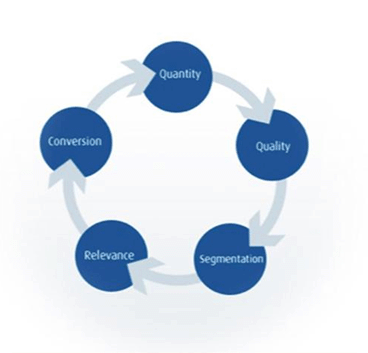Managing social media accounts is becoming an ever more time consuming job. For a business that has a large amount of followers it’s important to interact with them but in a time economical manner. With any new emerging technology there’s scope for sister services and social media management is no exception. There are now a number of tools that businesses can use to automate its social media sharing options. For many businesses however social media automation is something that it’s only just started to take advantage of.
Marketing Automation is effectively a subset of customer relationship management (CRM) that focuses on the definition, scheduling, segmentation and tracking of marketing campaigns. Simply put Marketing Automation makes tasks that were once manual much more efficient and it makes new applications and processes possible.
This process reduces time consuming and often repetitive tasks that are associated with the marketing process. Marketing Automation can be defined as two basic tasks:
- Customer segmentation
- Campaign management
Customer segmentation is a practice whereby marketers define and divide their audience according to gender, sex, age, and education. It makes it easier for marketers to target their efforts to a specific audience and understand and measure the efficiency of allocated resources. The marketer can also use this process to inform potential customers of business products and services. A marketer can utilise an email management campaign allowing for easy distribution of pre-formatted messages about products and services to a list of email contacts.
Marketing Automation Software has become the best solution as it allows a company’s marketing team to direct email and sales campaigns for increased revenue.
The benefits of Marketing Automation Software
Although there are clear benefits to automating some business practices many companies have yet to fully embrace the potential. 91% of businesses currently considering Marketing Automation are doing so for the first time. It’s not easy to find the best solution or option, especially for businesses new to this arena. Marketing Automation is becoming much more prolific, and as it becomes more widespread more and more companies are understanding not only how useful it could be, but how necessary it already is.
Increased social media channels and the accompanying audiences swamp marketing organisations of all shapes and sizes. These companies are inundated with a huge amount of data daily. This challenging and changing market dynamic places an increased pressure on ROI and more marketers are now using marketing automation platforms to manage complex, multi-touch buyer systems.
Market Overview
Email marketing is the core capability for B2B marketing automation platforms but this industry is changing rapidly. There’s less of a focus on simply using email marketing techniques and now there’s more integrated marketing functionality. This has lead to multichannel avenues like data collection and storage, campaign development and execution, ROI analysis, and reporting. Effectively the basic goal of marketers adopting marketing automation practices is to provide the ability to build, track, and manage digital campaigns and keep a close eye on the flow of business leads.
Simply put marketing automation platforms provide three core capabilities:
- Email marketing
- Website visitor tracking
- Central marketing database
These core services provide marketers with a platform to experiment, differentiate, and consider additional tools and services. This added functionality could make the automated marketing process better tweaked and more bespoke to a specific business and its marketing needs.
Pros and Cons of Marketing Automation
Marketing automation tools can provide a number of general benefits to businesses regardless of those companies size and marketing reach.
- Increased marketing efficiency
- Better ability to generate more leads (likely of a better quality too)
- A developed and multichannel perspective of customer behaviour
- Better understanding of sales and more considered marketing goals
- Improved lead conversion and ROI
However there are of course issues that have to be addressed when adopting automated services. Some of the main problems that may be encountered are:
- It can take time and implementation can be complicated
- Automated services are often under-utilised
- Business resistance to new practices can impede adoption and efficiency
How to pick the right Marketing Automation Platform
Now that you have a better understanding of the Marketing Automation process there’s still the question of what provider to use that needs answering. There are a number of services available but there are some things to consider that could help you narrow down the options.
- Understand your current marketing process
- Understand how to measure your success
- Identify the areas that you want to improve
The above considerations are important to keep in mind and will help your business to implement Marketing Automation processes more effectively. There’s another consideration however and perhaps one to consider at an early point.
Do you need a Marketing Automation Platform?
It’s worth evaluating if the added expense and hassle will benefit your marketing efforts. To do so you should evaluate a number of (effectively) research based questions. A good, comprehensive assessment of your organisations business needs, staff capabilities, management support, and financial resources is needed before Marketing Automation is implemented.
Remember that Marketing Automation practices are not a one size fits all technology. Be careful and honestly assess what your business needs. Don’t rush it and talk to users of any platform that you’re considering. User review and feedback is perhaps the best assessment of the benefits of a given Marketing Automation platform.
THE word in professional, persuasive, digital writing. Specialists in writing, tweeting and social sharing for businesses across the globe.
Get more leads, make more sales, grow your brand faster.






